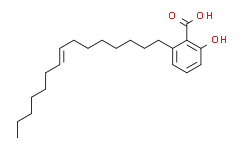Ginkgolic acid inhibits the 体外研究 SUMOylation of RanGAP1-C2 with the IC50 values of 3.0 μM. The level of SUMOylated p53 is markedly reduced by the ginkgolic acid treatment. Importantly, ginkgolic acid does not affect protein ubiquitination in cells. Ginkgolic acid inhibits the binding between E1 and GA-BODIPY in a dose-dependent manner. Ginkgolic acid (31.2 μg/mL) inhibits HIV protease activity by 60%, compared with the negative control, and the effect is concentration-dependent. Ginkgolic acid treatment (50 and 100 μg/mL) effectively inhibits HIV infection in human PBMC cells. Ginkgolic acid at the concentrations up to 150 μg/mL does not cause any significant cytotoxicity in Jurkat cells. GA only inhibits the growth of tumorogenic cell lines in a both dose- and time-dependent manner. Tumor cells are treated with GA for 72 h, 70.53±4.54% Hep-2 and 63.5±7.2% Tca8113 cells are retarded at GO/G1 phase, and the percentage of apoptosis is 40.4±1.58 and 38.4±1.7%, respectively. GA-treated activated caspase-3 downregulates the expression of anti-apoptotic Bcl-2 protein and upregulates the expression of pro-apoptotic Bax protein, eventually leading to a decrease in the Bcl-2/Bax ratio in tumor cellsin human PBMC cells. Ginkgolic acid at the concentrations up to 150 μg/mL does not cause any significant cytotoxicity in Jurkat cells.
Medlife has not independently confirmed the accuracy of these methods. They are for reference only.



 扫码关注公众号
扫码关注公众号